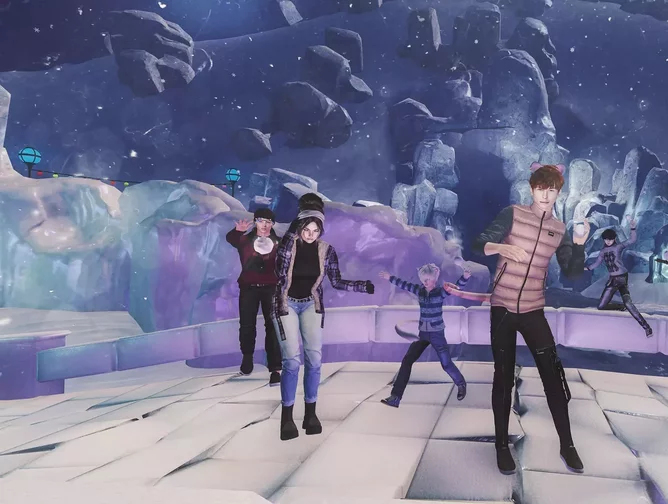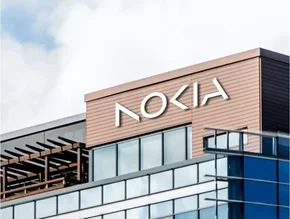Stepping into the Metaverse

The intertwining of physical and hyper-immersive digital spaces is a common theme in science fiction, from William Gibson’s Neuromancer to Cyberpunk: 2077 and The Matrix. This new decade is already blurring the lines between sci-fi and reality, as augment and virtual reality technology, rich virtual experiences, and IoT conspire to push us further than ever before into new virtual worlds - a metaverse where all our needs, be they educational, social, entertainment, or work-related are met, all within one persistent digital space.
“We now have the ability to take the real world virtual and the virtual world real”- Darren Savage, Chief Strategy Officer, Tribal Worldwide

What is a “metaverse”?
The term metaverse was coined in 1992 by author Neal Stephenson in his novel Snow Crash. Later popularised by the book Ready Player One, a metaverse is a fully-realised digital space that exists beyond the physical world in which we live. Sometimes, it’s held up as a utopian paradise where we can transcend the restraints of our physical existence, unbounded and free to explore new, infinite horizons. More frequently, however, the concept finds itself burdened by dystopian overtones - a binary prison for our minds; the symptom of a society in denial of an unjust or dying physical world.
As tempting as it is to glibly reference the “you die in the game; you die in real life” trope and call it a day, when it comes to the nature of metaverses in the real world (itself something of a contradictory phrase), science fiction only got it half right. While the concept of a metaverse is nothing new (Tron came out in 1982 for crying out loud), here at the back end of 2021 the metaverse trend feels like it’s hitting a tipping point as the technology reaches a stage when new digital worlds can make the jump from science fiction to everyday life. For some people, that’s a game changer of epic proportions.
"Some see the Metaverse creating as big a shift in online communication as the internet itself,” says James Morris-Manuel, EMEA Managing Director at Matterport, a company that uses digital twins to capture and manipulate 3D images of physical space. “The Metaverse is incredibly exciting. A virtual replica of the built world, made up of billions of digital twins, will fundamentally change how we experience, interact with, and analyse with space around us.”

“A virtual replica of the built world, made up of billions of digital twins, will fundamentally change how we experience, interact with, and analyse with space around us” - James Morris-Manuel, EMEA Managing Director, Matterport
Morris-Manuel isn’t the only person who’s confident (and vocal) about the metaverse’s potential to “change everything”. Facebook’s founder, Mark Zuckerburg, is throwing his company’s considerable weight behind a multi-billion dollar bet that the future of social engagement belongs inside a metaverse - preferably one that Facebook has created.
Earlier this year, more than 200 South Korean tech firms joined together to form the “Metaverse Alliance” - a sweeping series of public and private sector partnerships between financial institutions, game developers, telecoms, Samsung, and the government’s Ministry of Science and ICT, all aiming to infuse a number of industries (including national defense) with “metaverse technologies”.
But when it comes down to exactly how, and for whom everything is about to change - not to mention whether these changes will be for the better - specifics start to get a little thinner on the ground.
As with any transformative, once-in-a-generation technological development - just look at 5G - the metaverse means different things to different people
Innumerable worlds
“We now have the ability to make the real world virtual and the virtual world real,” explains Darren Savage, Chief Strategy Officer at Tribal Worldwide - a multi-faceted branding and marketing consultancy based in London. Savage and his team work with some of the world’s biggest brands to explore every conceivable option when it comes to helping those brands form better, more meaningful (more profitable, essentially) relationships with their customers. The metaverse, he continues, is the new Wild West for consumer engagement. “The current state of play with the metaverse is nascent with lots of experimentation by brands, especially in the luxury and gaming sectors, exploring how to use the concept as the basis for brand engagement, enhancing product ownership experiences, devising new commercial models and augmenting retail spaces,” he says. “These nuanced experiences will continue for some time, with the end stage being the emergence of a new economy of commerce, ownership and experience.”
Matterport, Morris-Manuel continues, has built digital “mirrors” of more than 5 million phsyical spaces, including shops, houses, office blocks, and even yachts. “We estimate there are over four billion buildings comprising 20 billion spaces in the world, yet only 1% of this is digitised, which represents an enormous opportunity to generate tangible business results in the Metaverse,” he enthuses. “The Metaverse is a new frontier that will open infinite opportunities for consumers and businesses alike, building a virtual digital twin of the world one step at a time.”
The potential for the metaverse to serve as a new economic frontier is causing ripples throughout the advertising sector. Lindsey McInerney, Global Head of Technology and Innovation at AB InBev - the global beverage giant which spends more than $1.5 billion every year on advertising - stresses that “The metaverse isn’t simply about virtual and augmented reality. It’s an exploding digital economy that looks set to change the way we think about physical and virtual experiences forever.” McInerney tells me that this is a “pivotal time” for brands that are “are only just beginning to figure out how they’ll interact with one another in this new shared space.”
For brands, the 2020s are already a scary place. Modern consumers are more savvy, less loyal, and have a much lower tolerance for behaviours like greenwashing and faux progressive messaging. Ad blocker usage is on the rise. For advertising execs, the metaverse is a playground where they can trial new events and experiences, potentially generating revolutionary levels of engagement from consumers long-jaded by unskippable video ads.

Exploring new, digital spaces, together
Any new technology that attracts a lot of users is going to attract advertisers and brands looking to capitalise. But what is it that’s actually drawing people into metaverse experiences?
I got in touch with Oliver Kern, who’s the Chief Commercial Officer at Lockwood Publishing. Based in Nottingham, Lockwood is the development house for Avakin Life, a virtual space they describe as “a 3D social universe” - a metaverse as far as Kern is concerned. “For the Avakin Life team, building a metaverse is all about creating a shared digital world which individuals can have a meaningful impact on - making friends, creating experiences and curating their own space within it,” he explains. Avakin Life has been going since 2013, and if you ask Kern, technology isn’t a prerequisite of a metaverse experience. The technology and the channel - whether it be VR, PC, or mobile - aren’t as important as making sure that a metaverse “should be a space for everyone.”
The idea of persistent digital spaces is nothing new to the gaming industry. MMORPGs like World of Warcraft have been maintaining these spaces and cultivating the communities within them for years. More modern multiplayer games like Fortnite and Roblox are taking this idea of shared spaces, events, and a persistent world even further. A metaverse is more like a framework, a hub from which you (and your friends) can move from one experience to another.
“It’s a place where everyone can be themselves and express themselves however they choose” - Oliver Kern, Chief Commercial Officer, Lockwood Publishing
Tribal Worldwide dipped its toes into the realm of a unifying social experience within what could be characterised as a metaverse last year. At the height of lockdown in the UK, the company paired up with Volkswagen and Forza - a popular series of racing games - to host a “virtual treffen”. “Passionate fans of Volkswagen regularly arrange drives and gatherings to show off, admire and talk all things VW. The global pandemic meant this wasn't possible, so we switched to the virtual world of Forza 4 Horizon,” said a spokesperson for Tribal. Reportedly, “fans flocked to the meetups.”
The idea that metaverse experiences can create events, held at “places” within the digital world is undeniably an intriguing one.

Quickfire Questions With… Oliver Kern
Oliver Kern is the CCO of Lockwood Publishing, the Nottingham-based game developer that’s been running its own metaverse, Avakin Life, for an audience of more than 200 million people since 2013.
Based on major investments we're seeing made into metaverse projects, why is big tech so keen on driving (and, to get cynical) controlling the future of this trend?
Being honest with you - big tech investing in social spaces isn’t a new development. We saw the same thing play out with social media and mobile messaging - wherever an audience goes to spend their time the money will follow.
As to why they’re interested in the metaverse specifically - it’s about time, knowledge and influence. Every company wants to have users spend their time with them and not someone else. Every company wants to know more about their audience. And every tech company wants to be the one influencing how platforms develop and are used. The metaverse can deliver on all three of these - if you get the experience right, you become the place for all kinds of social and creative activity and that gives brands an unparalleled insight into how an audience thinks, while also ensuring they spend their free time on your platform.
You’ve said it’s important that Metaverses are developed from the ground up by users, rather than by a select few "tech bros"? Is that a likely or even feasible way for things to play out?
We all make our own choices when it comes to our leisure and creative time - so why should the digital world be any different. As without our users, the metaverse is just an empty space.
The best and only way to create an inclusive world is to involve our users in the creative process. They are the ones showing us how to make Avakin Life an even more compelling place to hang out - then it’s on us to deliver those experiences.
What's your worst case for a metaverse future? How close does it look to William Gibson's book?
The worst case isn’t a digital dystopia - it’s a series of worlds so boring that no one wants to visit them. That’s why it’s so vital that users are involved in developing the future of the metaverse - if it’s left to a select few it will become something closed off, corporate and dull. Passion and joy will be replaced by worthiness and corporate messaging and with every visit you’ll question why you’re coming back.
Learning on a Digital Campus
Metaverses seem to already exist within the gaming industry. They look like they’re headed towards being the future of social media and interaction online. They’re poised to make advertisers a lot of money. However, if you ask Andy Lord, the CEO and founder of Credersi, there’s another kind of physical experience that metaverses can recreate: going to school.
“We are trying to bring a taste of the Metaverse to how we educate and train people,” he explains to me, elaborating that Credersi is building a platform where huge numbers of people can connect, experience events, and learn together - while being hundreds or thousands of miles apart. After a year when people are still trying to calculate the potential damage to the education of young people by a year of enforced remote learning, it’s arguable that digital learning needs a new direction.
“Education has been waiting for a revolution since the Victorian times, and whilst some of it may come from new teaching styles, new pedagogy, and new subject matter, the real enhancement will be how and where education is consumed,” says Lord. “It’s a journey and a marathon and we are partly constrained by technology, but you can see and feel the direction we are heading and the tech will find a way.”
Lord paints me a picture of “an ‘always on’ platform with endless subjects being taught by an endless number of instructors and lecturers,” with virtual recruitment fares, galleries, shops, games, car showrooms (he assures me he’s “in talks with somebody at the moment” about that one) and ways to communicate and network “wherever and whenever”.
If you can pull that off, he says, “then you have removed barriers posed by time zones, work patterns and eradicated the morning commute.”

The metaverse decade
Whether it’s recreating the classroom, the office, a dragon’s lair, or the neon-drenched streets of neo tokyo, I think if I can hang my hat on one thing about what a metaverse can do, it’s “everything. Anything.”
Morris-Manuel and the digital twin architects at Matterport are trying to bring exact copies of physical spaces into the digital world, working to break out of the technology’s current state, which he describes as “a series of private walled gardens,” and into “harmonious systems that relate and are inter-operational.”
Lord is also trying to build something analogous to the real world, but scaled up - unconstrained by petty concerns like real estate, bricks, and mortar - a global campus for work and learning where everyone’s admitted.
Savage and McInerney see metaverses as new frontiers for commerce. And Kern (not to mention Zuckerberg and half of Silicon Valley) is fighting to bring people together, into new social spheres where ideas, creativity, individuality, and fun can flourish. “It’s a place where everyone can be themselves and express themselves however they choose,” he says.
“One person might spend their time attending our live events, and another might spend their time hanging out with friends and chatting. All of these are equally rewarding ways to spend your time and that’s what’s so great about a metaverse - it creates a world where no two gamers have the same experience.”
They all have different ideas about what the metaverse is. They all have different dreams for its future. And they’re all right.







